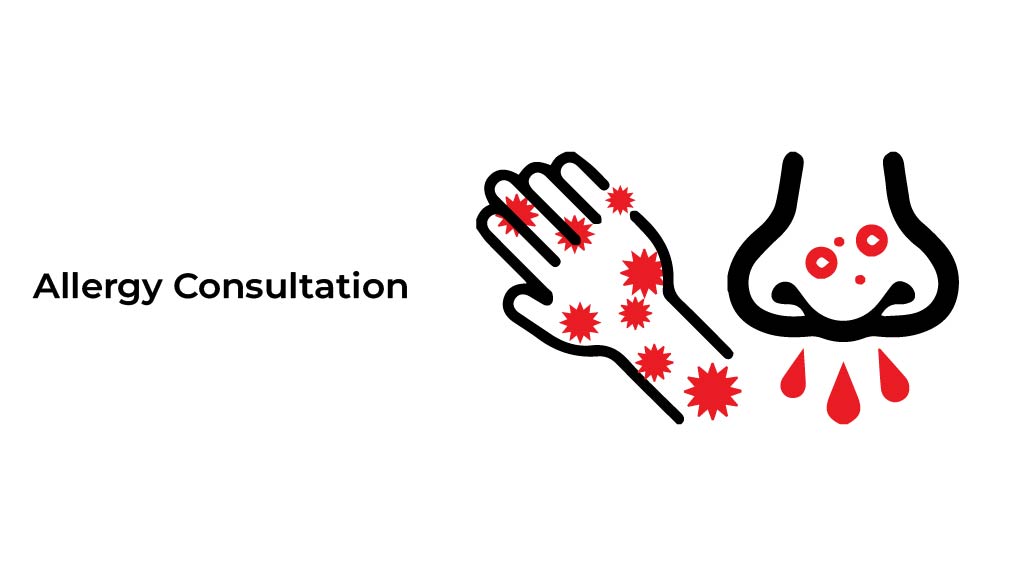
Allergies occur as a reaction of the immune system to foreign substances like pollen, insect sting, or pet dander, which are mostly considered less dangerous to the human body. Symptoms of allergy are usually mild to severe. Most patients prone to allergy, they must consult an immunologist or allergist if the conditions get extreme. The allergist recommends medication to reduce the allergy symptoms.
Symptoms of Allergy
There are different symptoms of allergy reactions:- Rashes
- Teary eyes
- Breathing problems
- Runny noses
- Headaches and dizziness
- Vomiting
- Diarrhea
- Low Blood pressure
Types of Allergies
There are different types of allergies:- Drug Allergy: Drug allergy occurs due to the reaction to the drugs taken by people. It will result in rashes, itching, and facial swelling.
- Food Allergy: Food allergy occurs due to a reaction of the immune system after eating certain foods. It will result in swelling on the face, inside the mouth, and hives.
- Insect Allergy: It is caused by the sting of the insects like bees, hornets, wasps, yellow jackets, and fire ants. Non-stinging insects like cockroaches can also cause insect allergies that can result in swelling in the sting area, cough, shortness of breath, and itching over the body.
- Pollen Allergy: The pollen released by plants causes pollen allergy. Some pollen can enter your nose, eyes, and lungs, causing allergy symptoms. Hay fever is one of the common reactions caused by pollen allergy.
- Pet Allergy: Many people are fond of keeping pets at home. However, pets can also cause allergies to human beings. There are different reactions to pet allergy-like intense rash on the body, breathing problems, etc.
- Mold Allergy: It is also very common as mold sources can send bacteria into the air to enter human beings. Fungus spores are one of the primary sources of mold allergy. Fungus mainly grows on rotten logs, fallen leaves, or grasses. Dampness is one of the significant sources of growing fungus. You must be careful while touching them to avoid mold allergies
When do you need to consult an Allergist?
Rhinitis allergy is very common that affects 10% to 30% of the total population worldwide. Hay fever is the most common symptom of this allergy. Following are the reasons to visit an allergist;- If the symptoms like itchy or swollen eyes, running nose, sneezing, and nasal congestion are present daily or seasonally.
- If a patient wants to know the cause of an allergic reaction and minimize it.
- Severe allergy situations can impact the quality of life and mobility of one person.
Are allergies permanent?
Some allergies disappear with time, while some other allergies can be lifelong. There is no specific cure for allergies; however, you can treat symptoms with medications and take preventive steps to avoid allergies in the future. The following treatments are recommended:- Immunotherapy: It cannot cure the allergy symptoms but helps reduce the allergic reaction to allergens. Doctors recommend immunotherapy if medications or allergy medicines do not control symptoms or react with the patient’s other medication.
- Allergy Shots: Allergy shots are another way to reduce the symptoms of allergies to pollen, dust mites, pet dander, molds, bees, and stinging insects.
- SLIT: SLIT in small doses (in tablet form) can be used to improve the tolerance against the allergen and reduce the symptoms of allergies to dust mites and pollens of grass.
Do allergies go away?
Some people also think about whether allergies go away or not. In some cases, allergies outgrow in case of its development at the child’s early age. While on the other hand, allergies disappear with age. Likewise, in some other cases, pollen and pet dander allergies become less severe as one’s ages. Studies also show that a person’s exposure to a small amount of allergen over time also helps to increase the tolerance of a person to allergy.Prevention of Allergy
You can prevent or control allergy by taking different steps:- Avoiding allergens: It is very difficult to avoid allergens but try to reduce contact with them as much as possible. Similarly, you can prevent allergens by controlling the indoor allergens and improving the indoor air quality. Ventilating indoor areas and using air cleaners may help clean the indoor air. Moreover, you must avoid the source of indoor allergens like pets, soft furniture, dump areas, and indoor plants.
- ·Healthy Home Environment: Keeping a healthy home environment can also help to avoid allergies. Airflow can be improved in a house by leaving interior doors open and running exhaust fans in the place.
- ·Medication: Medication is used to reduce allergic symptoms, and can also avoid allergens.
- Proactive approach: There are multiple ways to prevent the allergen reactions such as keeping a diary to record the things or items that cause an allergy and what to take to reduce the symptoms if exposed to the allergen.
References:
- https://www.docdoc.com/medical-information/procedures/allergy-consultation
- https://www.mayoclinic.org/diseases-conditions/allergies/symptoms-causes/syc-20351497
- https://www.aafa.org/types-of-allergies/
- https://www.medicalnewstoday.com/articles/how-to-get-rid-of-allergies